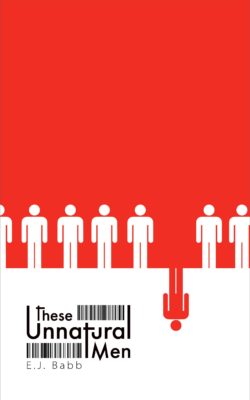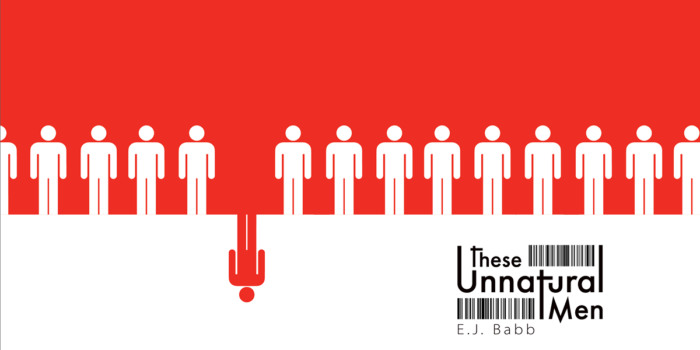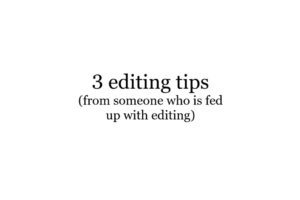
Get These Unnatural Men in paperback and on Kindle here.
These Unnatural Men
by Emily Babb
Chapter One
Most would waver by the door before announcing themselves, sidestepping apologetically into the room as if reluctantly intruding on a private moment. I hated all that. To me the room was empty, save myself and the patient.
The case was simple: Mrs Furstein had been admitted to the facility with dementia. The fact that her condition had been allowed to reach such an advanced state could have been interpreted by some as negligence, but I suppose her family’s judgement had been somewhat skewed by accountability.
The patient’s husband was squeezed into the bed beside her with his face nuzzled deep into her neck, yet his devotion was of little consequence; she was watching her loosely cupped hands because they were in close proximity to her face, not because she recognised the fingers attempting to intertwine with hers. She also failed to acknowledge her three adult children standing dutifully in the corner of the room, their faces downturned so as not to make eye contact with the being that resembled their mother.
“What’s going on.” The husband spoke without question in his voice as I approached the bed, the white of his eyes reflecting the light as he tracked my every move.
I contemplated peeling him off of his murmuring wife to continue with my work, but instead I looked to the fob watch attached to my right breast. “It is…three thirty-five exactly, Mr Furstein,” I said, “the treatment is scheduled for four o’clock.”
I didn’t wait for a response, which no doubt would have been one of contention. Taking an alcohol pad from the trolley I held and extended the patient’s rubbery forearm and smeared the solution onto her skin. With my left hand still gripping the wrist, I popped an empty syringe out of its plastic casing and lined the needle up against a prominent vein.
“What are you doing?”
For the sake of civility I drew back slightly but kept the needle in line with its target. “Cataloguing her blood, Mr Furstein. It’s standard practice before treatment.” I knew he was aware of this, having reminded him of the process mere hours before, but I felt duty bound to explain myself again.
While Mr Furstein heaved himself into the sitting position I quickly extracted a vial of blood from the patient, which was remarkably rich-looking despite the pale flesh that encased it. The wound was addressed before Mr Furstein had the chance to refocus.
I turned to hand the blood to the phys aid, whose gaze remained on the patient’s husband. “Should I take that to the lab,” she asked slowly, “or do you need me here?”
“Take it,” I said, thrusting the vial into her hand.
As I readied for the procedure Mr Furstein leaned across the bed to watch me, his hand automatically stroking his wife’s hair as she whimpered. “Does she really need all this?” he asked. “I’m starting to think this is a mistake. I want to take her home, doctor.”
“Mr Furstein, I’m not a doct…” I stopped myself from clarifying things yet again. If it comforted him to think of me as a doctor then I would have to allow it, he clearly wasn’t at all capable of retaining any information about my profession.
I have always found the public’s continued misconception of my work to be baffling. Familiarity, it seems, is far more comforting than progress.
Mrs Furstein’s mouth made an ‘o’ shape as I administered the muscle relaxant. She sank deeper into the bed, jaw slack and limbs limp, but Mr Furstein continued to paw at her. It was three forty-two and I was getting behind schedule.
“Mr Furstein, you’re going to have to move away from your wife for a moment.”
“No, I can’t.”
“You’re going to have to move away, you’re hurting her. I don’t want to have to call security.” I picked up her wrist to show the swollen finger marks he had left.
The old man dithered between getting up and lying back down. As he began to weep, all I could think was how much simpler it could be. Medical opinion should be enough, it should be the stronger argument against the cruel selfishness of the family, but society deems sentiment capable of overruling logic.
It was three forty-four. I looked to his children for assistance but their blank faces reflected their father’s fears. Like him they were unable to appreciate the critical nature of the procedure, their silence forming a reluctant alliance with him.
I knew what they all needed me to say, I just had to get the words out convincingly.
I took a breath. “Trust me,” I finally managed, pushing the old man’s arm as gently as I could away from the patient, “this is the best thing you could be doing for her.”
As predicted, all he had needed was the permission to let go. He moved away up and perched on the edge of the bed, although a protective arm still rested on her shoulder.
Checking Mrs Furstein’s vitals took just a few minutes. She watched me calmly as I worked, holding herself as still as possible as if she knew I was trying to help her. She had been an easy patient to soothe throughout her stay at the facility, permitting anyone to dress, feed or examine her with no reaction other than a slow blink.
It was rarely the patients that complicated matters.
The final stage before the procedure itself was to prepare the forms. On the table at the foot of the bed I set up the five eGreement devices side by side, each with differing legal statements outlining the treatment and the potential risks involved. The forms were nothing more than a formality as the pre-procedural documentation was iron clad, but as medical proxy Mr Furstein was required to demonstrate his acceptance of the treatment before anything could go ahead. Regulations have eased considerably over the years but there is still a lingering need for the profession to cover itself with endless witnessed signatures.
Once the devices were ready I offered the stylus to Mr Furstein.
“If I could just ask you to sign these, sir, I need a signature on each before we get started.”
It was three forty-seven.
“I can’t do this,” he mumbled, his voice barely audible. “I can’t sign them, she doesn’t even need this. I’ll take her home. It’s best if I take her home again.”
I couldn’t disguise my frustration as I exhaled through my nose. “I’m afraid that’s not possible. Either you sign these now and we go through with it today or we’ll be forced to get a court injunction against you, and that could take weeks. I’m sure that would cause a lot of stress for you and she’ll be quite poorly by then. We’ve been working towards this for a while now, haven’t we? You know how ill she is. All you have to…”
Mr Furstein leapt forward, knocked the stylus out of my hand and grappled for the forms. I spread my arms out to protect the devices but his two sons had already grabbed him by the shoulders and hauled him onto the nearest chair. Mr Furstein rasped and wheezed, having winded himself in the struggle.
“Mr Furstein, please try and remain calm,” I said, although my words would have made little impact if they had been heard. I sounded hollow and weary even to myself.
Mr Furstein gave a dry cough. “You can’t take her. Something will go wrong, I know it. She’s all that’s ever mattered to me, I can’t let you do this…please.”
All three of his children winced simultaneously, but said nothing.
I glanced at my fob watch: three fifty-one. I had nine minutes in which to convince the medical proxy to sign the forms before the room had to be vacated and the procedure abandoned. I couldn’t have a black mark against my name for such a simple case, not that early on in my career.
I glanced at my fob watch: three fifty-one. I had nine minutes in which to convince the medical proxy to sign the forms before the room had to be vacated and the procedure abandoned. I couldn’t have a black mark against my name for such a simple case, not that early on in my career.
I dragged over a chair and sat beside Mr Furstein, watching as the redness that had cultivated in his cheeks spread gradually across his otherwise colourless face. “Mr Furstein,” I said as softly as I was able, “I can’t pretend to know what you’re going through right now and I know I’ll never fully understand how much your wife means to you, but this isn’t your wife. She isn’t the person you married. You might ask how I know this, how could I possibly know anything about her when I’ve only been treating her for a few short weeks?”
His eyes broke away from the bed and hovered towards the floor.
“I know because her brain told me. Her test results told me. Internally your wife has changed so dramatically that comparing a scan of her brain two years ago to one taken today would be like looking at two completely different people. Don’t you agree that she’s changed? And what’s important is…”
“Did the brain scan tell you she’s in pain?”
I looked up at the Fursteins’ daughter, who had tentatively moved away from the corner of the room. Her body was rigid, and as the tears fell she scrubbed them roughly from her cheeks.
“Pain?” I said. “Not with…”
The daughter shook her head and jutted her chin towards her father. His gaze was still directed at the linoleum.
I nodded. “Well…yes. It showed that she’s in some pain.”
Three fifty-five.
“Quite a lot of pain, in fact.”
“You see, Dad? Mum needs this. I’m as scared as you are but we need to do this for her before she gets any worse. We can’t just leave her to die like this. She’s…god, just look at her for christ’s sake, we need to do something.”
Watery saliva fell from the old woman’s mouth and was absorbed by her bed sheets. It was now three fifty-six, and my hands had clenched into fists.
“But you don’t understand,” he said.
“I do, Dad. I do understand.”
Mr Furstein looked up to his daughter for a few moments, his lips moving silently. Finally he rose shakily to his feet and, expelling a weighted groan, somehow managed to pass his wife without permitting himself another look.
A series of high-pitched bleeps meant his signatures had been approved on the e-Greement devices. My nails unfurled from my palms.
Now I had to move quickly. I unlocked the cabinet that contained the Coactucin and, with a fresh syringe, pierced the rubber lid to withdraw the liquid.
“Okay, Mrs Furstein, in a minute I’m going to give you some medicine that will make you feel a little sleepy.”
Three fifty-seven.
I glanced over at the family. “If there’s anyone here who wishes to stop the procedure please make your objections known now.”
Silence.
Three fifty-eight.
I spoke faster, this time to the patient. “Mrs Furstein, your husband is your medical proxy and has approved your procedure on your behalf due to your advanced dementia. If you wish to stop this please give me some indication now, otherwise I’ll administer the Coactucin.”
Silence.
But then there was a quiet, guttural noise. It came from the depths of her throat and out through her gaping mouth. I couldn’t tell whether it was anything more than a gargle – I hadn’t detected a precise word – but her pale blue eyes were looking directly into mine and her heavily lined lips twitched at the corners. I looked to the family but they were huddled together at the other side of the room, heads bowed and hands clasped around each other as if in prayer. Not one of them seemed to have heard.
Three fifty-nine.
I stabbed the needle into the tubing of Mrs Furstein’s IV and pushed the plunger. The elderly woman’s eyelids fluttered, her head sank further into the pillow and she became unconscious.
Four o’clock.
The door creaked as one of the sweeps peered into the room.
Noting the empty syringe in my hand, he checked his fob watch and scribbled the time onto the device in his hands. He then offered a small bin lined with a plastic bag. I held the syringe over it, hesitating.
Section 10: Part 5: Even with the use of a medical proxy the euthanasist must attempt to gain firsthand consent for the procedure from the patient, having made him/her fully aware that the administration of Coactucin will result in certain death. If a comprehensible response is given, the procedure must be terminated.
Comprehensible.
I dropped the syringe.




Leave a Reply